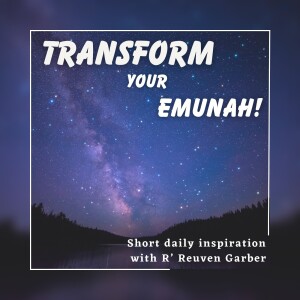
Wednesday Sep 18, 2024
142 - Raining with Faith
We discussed the verse which says, "trust in HaShem and do good." And we mentioned the Ramban who explains that the reason this verse is written precisely in this way, firstly stating, "trust in HaShem" and only thereafter stating "and do good," is to teach us that the action of bitachon, the action of trusting in HaShem, within HaShem's perspective, is viewed independently of our deeds.
Of course, as taught by countless Torah sources, we ought to do our best to score as best as we can on our scorecard in HaShem's books. And there will always be consequences, both for our mitzvos as well as for our aveiros. Nevertheless, the powerful opportunity of bitachon that HaShem has given us is completely independent of our actions. And as the Ramban writes in his own words, even a completely wicked individual who chooses to exercise his bitachon will be able to access and reap the many wonderful benefits that we are taught about one who trusts and places their bitachon in HaShem.
Many Torah sources outline that emunah, bitachon and tefillah are like synonyms. The more one believes in HaShem and chooses to rely on HaShem, the more one will talk to HaShem. One example of this is the verse in the Torah which states about Moshe Rabbeinu, "vayehi yadav emunah" - "and his hands were emunah." And the famous translation, the Targum Unklos, translates this as, "and his hands were spread out in prayer," translating the word emunah as prayer. Because again, the more my belief in HaShem is sincere, the more I will want to rely on HaShem in all my endeavors. And of course, one of the main ways of expressing that belief and reliance is by praying to HaShem, communicating and talking about anything and everything.
There is a well-known story recounted in the Gemara about a holy and pious individual known as Choni HaMe'agel, Choni the Circle Maker. And the Gemara explains how this name came about. One time there was a severe drought in the land of Eretz Yisrael, and it appeared as if HaShem was not paying attention to the people's prayers because no rain was anywhere near to be seen. And the people decided to approach the holy and righteous Choni to pray on their behalf. Choni prayed, but still no rain was to be seen. Because of Choni's tremendous sensitivity to the people around him who were experiencing so much suffering from the drought, he felt a tremendous responsibility to make sure that it would rain. So as the Gemara recounts, Choni took a twig and drew a circle on the floor around him and stood within that circle. Within the confines of the circle he had drawn, he prayed to HaShem that it should rain. Eventually, a small drizzle started to rain down. But Choni said, "HaShem, that is not the rain that I requested for." And soon after that, a tremendous downpour of too much unpleasant rain began to fall. And Choni again turned to HaShem and said, "HaShem, that is also not what I requested for." And after that, eventually, a steady stable rain began to fall, relieving the people from the drought.
There is much to learn from this story, but a most powerful take home is the power of tefillah. Emunah, bitachon, and tefillah are mechanisms that HaShem created in our world that work independent of our actions. "Thank you, HaShem, for teaching me that even though I might have committed certain transgressions, nevertheless, I always have the opportunity to grow in my emunah and my bitachon, and by extension, pray to you for anything and everything."
No comments yet. Be the first to say something!